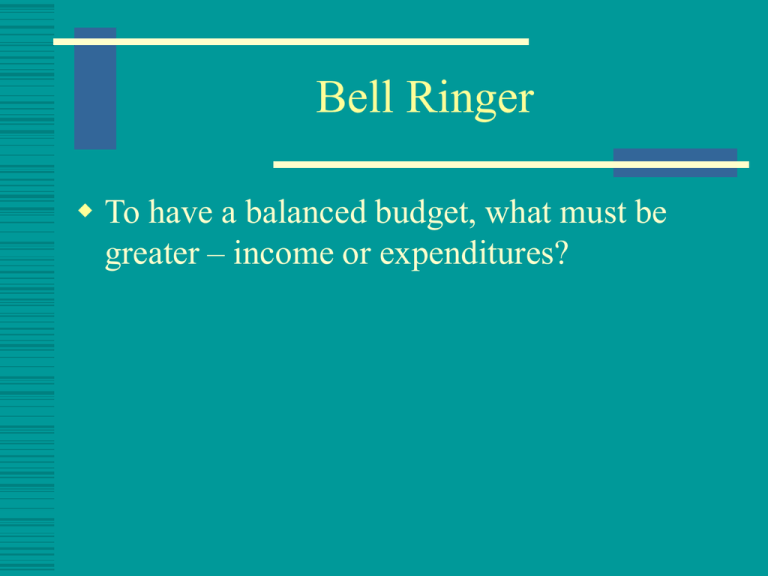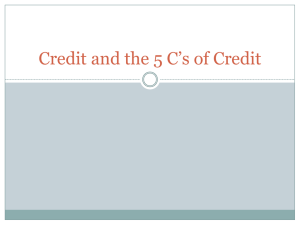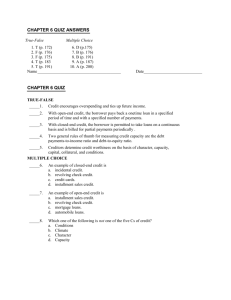Economics and the Individual: Saving, Borrowing, Buying
advertisement

Bell Ringer To have a balanced budget, what must be greater – income or expenditures? Spending and Saving Money Chapter 15, Section 2 By the end of today’s lesson, you should be able to: Describe how to make financial decisions Balanced Budget Income must be greater than expenditures. When income is greater, many people save some of the remaining money each month. When expenditures are greater, many people borrow money or buy on credit. Be A Smart Shopper – Shop for Quality Buy something that will last Research item before you buy it by talking to friends or magazines such as Consumer Reports Try the item Read the label carefully Be A Smart Shopper – Shop for Value Compare ads from different stores to find the best price Sony 24” FD Trinitron WEGA Flatscreen TV (KV24FS120) Wal Mart - $347.00 Best Buy - $319.99 Be A Smart Shopper – Shop for Value Unit Price: Price of a standard unit of measurement What is the better deal? A 4-ounce bar of soap for 52 cents or a 6-ounce bar of soap for 72 cents? 4 oz. – 13 cents per ounce 6 oz. – 12 cents per ounce Be A Smart Shopper – Shop for Value Compare the price of store brand groceries to brand name groceries. Store brand groceries are usually less expensive. Shop at seasonal sales. Be A Smart Shopper – Avoid Impulse Buying Supermarkets will place items by the check out or at the end of aisles hoping you will add the items to your cart. One-Day Sales – doesn’t leave time to comparison shop High Pressure Sales Techniques Know the return policy and keep your receipt. Ways to Save Money Payroll Deduction Deposit money into an account that earns interest By earning interest, you increase your savings. Investment Money Saving with a Bank or Credit Union Savings Account: pays small amount of interest, but offers immediate access to your money. Certificate of Deposit (CD): pays higher interest but requires that the money be left for a specific amount of time. For example, a 2-year CD is currently paying 2.9% interest. Government Bonds: safest investment; bonds are worth more when they mature. Company Bonds: IOU from a company Investment Investment: buying of something the purchaser expects to increase in value Risky but has much higher rate of return Most common example is the stock market. A share of stock is part ownership in the company. Mutual Funds are safer investments, because they purchase stocks and bonds in different areas. Investments help the economy. Pay yourself first . . . a little can add up A little can add up! Save this each week … at 5% interest … in 10 years you’ll have $7.00 5% $4,720 14.00 5% $9,440 21.00 5% $14,160 28.00 5% $18,880 35.00 5% $23,600 You can buy … two fast food meals or one movie ticket (and a candy bar) or save $7.00 this week. You can buy … two small cheese pizzas or one large pepperoni pizza, delivered or one new CD or save $14.00 this week. Teens – Lesson 12 - Slide 12-A What can you give up to save for your financial goals? The Rule of 72 How many years will it take to double my money? 72 DIVIDED BY ________________________ = INTEREST RATE YEARS TO DOUBLE A SUM OF MONEY At what interest rate will my money double in a set number of years? 72 DIVIDED BY ________________________ = YEARS TO DOUBLE A SUM OF MONEY INTEREST RATE REQUIRED Teens – Lesson 12 - Slide 12-H Borrowing Money Banks Credit Unions Mortgage Companies Finance Companies Department Stores The 3 C’s Character—will you repay the debt? From your credit history, does it look like you possess the honesty and reliability to pay credit debts? Have you used credit before? Do you pay your bills on time? Do you have a good credit report? Can you provide character references? How long have you lived at your present address? How long have you been at your present job? The 3 C’s Capital—what if you don’t repay the debt? Do you have any valuable assets such as real estate, savings, or investments that could be used to repay credit debts if income is unavailable? What property do you own that can secure the loan? Do you have a savings account? Do you have investments to use as collateral? Teens – Lesson 7 - Slide 7-B The 3 C’s Capacity—can you repay the debt? Have you been working regularly in an occupation that is likely to provide enough income to support your credit use? Do you have a steady job? What is your salary? How many other loan payments do you have? What are your current living expenses? What are your current debts? How many dependents do you have? Teens – Lesson 7 - Slide 7-B manner of payment codes status type of account code status timeliness of payment O Open (entire balance due each month) 0 Approved not used; too new to rate 1 Paid as agreed 2 30+ days past due 3 60+ days past due 4 90+ days past due 5 Pays or paid 120+ days past the due date; or collection account 6 Making regular payments under wage earner plan or similar arrangement 7 Repossession Teens – Lesson 7 - Slide 7-G 8 Charged off to bad debt R Revolving (payment amount variable) I Installment (fixed number of payments) Borrower’s Rights truth in lending act (1968) Ensures consumers are fully informed about cost and conditions of borrowing. fair credit reporting act (1970) Protects the privacy and accuracy of information in a credit check. equal opportunity act (1974) Prohibits discrimination in giving credit on the basis of sex, race, color, religion, national origin, marital status, age, or receipt of public assistance. fair credit billing act (1974) Sets up a procedure for the quick correction of mistakes that appear on consumer credit accounts. fair debt collection practices act (1977) Prevents abuse by professional debt collectors, and applies to anyone employed to collect debts owed to others; does not apply to banks or other businesses collecting their own accounts. Borrower’s Responsibilities Borrow only what you can repay. Read and understand the credit contract. Pay debts promptly. Notify creditor if you cannot meet payments. Report lost or stolen credit cards promptly. Never give your card number over the phone unless you initiated the call or are certain of the caller’s identity. How Much Can You Afford? never borrow more than 20% of your yearly net income If you earn $400 a month after taxes, then your net income in one year is: 12 x $400 = $4,800 Calculate 20% of your annual net income to find your safe debt load. $4,800 x 20% = $960 So, you should never have more than $960 of debt outstanding. Note: Housing debt (i.e., mortgage payments) should not be counted as part of the 20%, but other debt should be included, such as car loans, student loans and credit cards. monthly payments shouldn’t exceed 20% of your monthly net income If your take-home pay is $400 a month: $400 x 20% = $80 Your total monthly debt payments shouldn’t total more than $80 per month. Note: Housing payments (i.e., mortgage payments) should not be counted as part of the 20%, but other debt should be included, such as car loans, student loans and credit cards. The ABC’s of Borrowing Principal: the amount of money borrowed Interest:amount of money charged to borrow the money High-Risk borrowers are charged higher rates of interest. Collateral: item used to secure the loan Repossess: take back the item bought on credit or used to secure the loan Bankruptcy: a legal statement that one can not pay one’s debts Using Credit Cards MasterCard, Visa, Discover, American Express Department Stores offer charge accounts for their regular customers When you buy an item with a credit card, the business collects the money from the credit card company. The credit card company sends you a bill for the month’s purchases. There is a minimum monthly payment required. If you do not pay off the entire balance, you are charged interest on the remaining balance. Advantages of Using Credit Convenient Do not have to carry around cash Some credit cards offer rebates or extra warranties on items purchased with the credit card. Dangers of Using Credit Spend more money than you can afford to pay Charged interest Interest accumulates which can result in taking a very long time to pay off the purchase Can accumulate a lot of debt Increased impulse buying True Cost of Credit You get a credit card offer to borrow up to $2,000 and pay only $40 a month. The interest rate is 18%. You buy a big screen TV for $2,000. You pay $40 a month. At the 18% interest rate, $30 is interest and $10 is toward the principal (the original $2,000 borrowed). If you pay the minimum $40 payment each month, it will take over 30 years to pay off the TV. The total amount of interest you will pay is almost $5,000. This puts the true cost of the TV at almost $7,000!!! If you saved that $40 a month . . . By investing $40 a month in a mutual fund account paying only 8% interest per year, over the 30 year period you would earn $46,000 in interest. Your mutual fund account would be worth over $60,000. Comprehension Check How much of your income should be spent on debt payments? 20% Comprehension Check What is an investment? The buying of something the purchaser expects to increase in value. Comprehension Check What type of interest rates do finance companies typically charge high-risk borrowers? High Interest Rates Comprehension Check What form of credit do department stores offer their regular customers? Charge Accounts Comprehension Check What is principal? The amount of money borrowed Comprehension Check What are the advantages of using credit to make purchases? Convenient, No need to carry cash, Incentives offered by the credit card company Comprehension Check What are the disadvantages of using credit? Spend more money that you can afford, Charged interest, Hidden cost of credit Ask-Pair-Share Ask your partner a method of saving money and a method of borrowing money?





